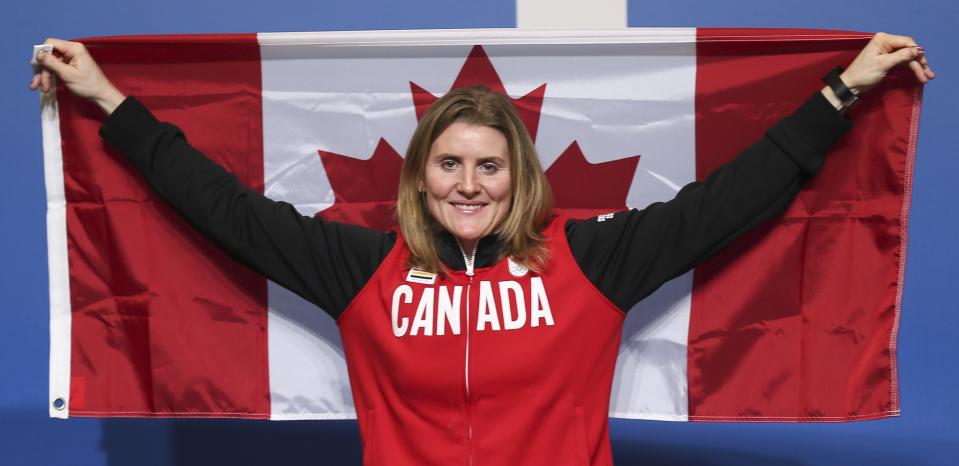Wickenheiser's legacy leaves a lasting impression on hockey

A few summers ago, Hayley Wickenheiser participated in a summer camp in Cole Harbour, N.S. The camp was run by hockey coach Brad Crossley, well-known for his work with NHLers like Sidney Crosby. It was attended by a who’s who of pro hockey, including the aforementioned Pittsburgh superstar.
After working alongside Wickenheiser on the first day of camp, Crossley went home and told his young hockey-playing daughter about the scrimmage.
“Man, I’ve never seen a girl play hockey like that,” he told her. “It’s doesn’t matter who she’s on the ice with she’s the hardest worker and the most competitive person on the ice.”
It’s something Alexis Crossley, now 22, has never forgotten. Like Wickenheiser, Crossley grew up playing hockey with boys because there weren’t enough girls to field competitive teams.
“I remember when I was a kid, I hid in the bathroom and tucked my hair up so no one would know I was a girl,” Wickenheiser told The Canadian Press. “I just went through hell really, to play. Girls don’t have to go through hell anymore to play hockey.”
On Friday evening, without any fanfare, Wickenheiser, 38, widely considered the greatest female hockey player of all time, announced her retirement in a tweet. It marked the end to an illustrious 23-year career in which she not only represented the best of Canadian hockey, but the women’s game as well.
Dear Canada. It has been the great honour of my life to play for you. Time to hang em up!! Thank you! #grateful #graduationday #canada pic.twitter.com/qzEo6sTgP2
— Hayley Wickenheiser (@wick_22) January 14, 2017
Several days later, it’s still hard to quantify the impact she’s had on the game.
At 15, Wickenheiser first suited up for Canada’s national team in 1994. According to Hockey Canada, there were 19,050 girls registered to play nationwide. Today, in the latest figures from the International Ice Hockey Federation, Canada has 87,500 registered female players. There’s very little doubt that Wickenheiser has played a big role in growing the game for women.
“She is the epitome of hockey,” said Crossley, who captains the women’s hockey team at Boston University. “She is a legend and I would say that every single girl who plays hockey, no matter how young they are, knows exactly who she is and it’s not because her career was so long but because she was so dedicated to the game.”
In hanging up her skates, Wickenheiser has won every honour the game has to offer women internationally: seven golds at the world championships, four Olympic gold medals, MVP of the 2002 and 2006 Olympic women’s tournaments, and it’ll be a while before anyone comes close to her 379 career points (168 goals, 211 assists) in 276 games for Canada.
A gifted athlete, she also appeared in the 2000 Summer Games, playing softball for Team Canada.
After the 2002 Olympics in Salt Lake City, the native of Shaunavon, Sask., made headlines when she referenced Team USA disrespecting Canada’s flag. She showed the country that Canadians can be civil without being servile.
“You know what? The Americans had our flag on their floor in their dressing room,” Wickenheiser told the CBC after beating the U.S. for gold. “And now I want to know if they want us to sign it.”
Most famously, Wickenheiser’s the only woman to have scored a goal in a men’s professional hockey league game, which she did while playing for Kirkkonummen Salamat in Finland’s second division. There was also a contract to play in Sweden’s third division, and a pair of tryouts at rookie camp with the Philadelphia Flyers.
“That kind of set her apart from everyone else,” said Crossley, who won gold with Canada at the world under-18 tournament in 2012. “She kind of said, ‘Just because I’m a girl, it doesn’t mean I can’t do this.’ That probably really stood out to girls not only all over the country, but all over the world who play hockey. It said we have a future in this sport.
“Growing up for me I always had to dream about playing in the NHL because that’s all there was. Now girls get to grow up dreaming about playing professional women’s hockey.”
The game for women has grown to the point where there are now two professional leagues – the Canadian Women’s Hockey League and the National Women’s Hockey League. The days when girls had to hide in bathrooms or pretend to be boys to play hockey are long gone.
On Saturday, the Edmonton Oilers – Wickenheiser’s childhood team – honoured her before their game against the Calgary Flames. As part of the ceremony, two local girls’ minor hockey teams were on hand, and Wickenheiser had a message for them at the end of her speech.
“To all the girls behind me,” said Wickenheiser. “This is the new normal now – full rinks (and) fans for women’s hockey.
“The only thing I ask of you guys moving forward in the game, is to leave the game in a better place than you found it.”
MORE HOCKEY COVERAGE ON YAHOO SPORTS:

 Yahoo Sports
Yahoo Sports 

